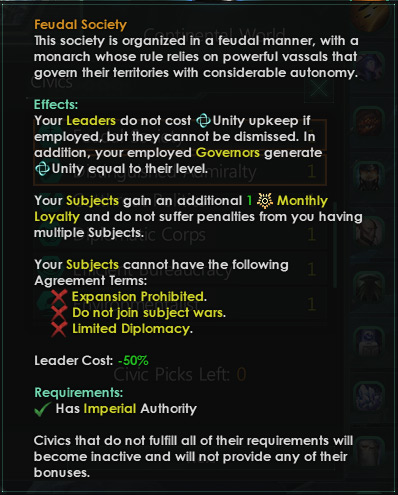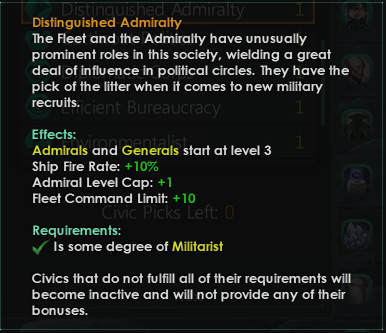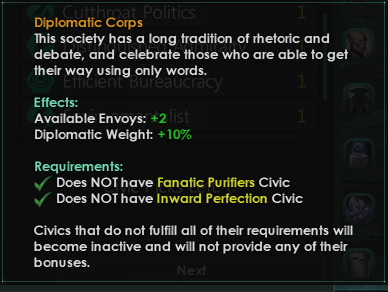Stellaris: How Does The Feudal Society Civic Work?
This post may contain affiliate links. If you buy something we may get a small commission at no extra cost to you. (Learn more).
Feudal Society is your go-to civic if you want to play as the Padishah Emperor of your own Landsraad. It allows ruling over many different vassal states without the main drawbacks that usually come with it: constrained growth and diminishing loyalty.
This is a powerful playstyle that can be very fun and rewarding in both the early and late game, based on your choices.
Details on The Civic Itself

The only prerequisite of Feudal Society is having an imperial government.
De facto, this locks us out of the Egalitarian ethos and of all the civics that require it.
The civic includes some benefits unrelated to vassals. Namely:
- Unity per Governor level, which is quite useful early on but becomes irrelevant a couple of decades into the game.
- -50% Leader Cost, a hefty discount that will serve us well for the entire playthrough, netting a few thousand unity. Not bad for a secondary benefit.
- No leader upkeep. Quite a bit of free unity in the very early game, when we have a bunch of leaders managing our rising empire and very few bureaucrats.
As you can see, these are all minor perks that are supposed to mimic the workings of a feudal government, while giving us a little boost unity-wise when we have no chance of having vassals (yet).
However, the main advantages of the civic come in later, when we manage to subdue another empire or two:
- +1 Monthly Loyalty per subject empire is very useful to keep our powerful vassals in check, content with their position.
- No Loyalty loss from multiple subjects is the main point of the civic: no “divided patronage” penalty, no uprisings, just a sprawling empire firmly under our command.
These come at the cost of not being able to restrict the expansion and the diplomacy of your subject empires.
Gameplay Strategy

Once the effects of the Feudal Society civic are clear enough, let’s move onto a simple but effective strategy to make the most out of your vassals.
Step 1: Early Rush
Feudal Society works best when built around an early rush: the sooner you get vassals, the sooner you will be able to get resources out of them.
Declare early wars against non-advanced AIs to grab as many minions as possible for your empire. Usually one or two are enough to guarantee an early snowball into a less exciting but much more secure mid-game.
Step 2: Leverage that Loyalty
You will have a lot of Loyalty because of the +1 from the civic, and because of the subject-friendly terms you will be obligated to enforce because of Feudal Society.
Don’t be afraid to spend your Influence and raise your vassals’ obligations to the crown as much as you can without provoking them into open rebellion.
It’s usually best to get raw resources out of them – food, minerals, and energy – instead of going for alloys, as this will net you more stuff.
Get your Pops working specialist jobs such as Artisans and Metallurgists to refine all your tributes and create a sizable war fleet.
Step 3: Use Holdings

Holdings are key to further advancing your economy as you grow your empire by forcing neighbor after neighbor into submission.
Here’s a summary of the best holdings to use.
| Holding | Effect | Use if |
|---|---|---|
| Overlord Garrison | Secure Loyalty by landing armies | Low on Loyalty |
| Aid Agency | Give basic resources for unity and Loyalty | Behind on Traditions |
| Satellite Campus | Get research for both subject and overlord | Behind on Technologies |
These are by far the most efficient holdings for the basic tasks you’ll need during the early game.
Later on, you might want to replace them with ministries, at least for your larger vassals.
Step 4: Repeat
Once you’ve amassed a large fleet, just keep expanding by waging war on new neighbors with the subjugation casus belli.
This is much more convenient than direct expansion in terms of enforcing your peace terms.
As your vassals grow on their own, you’ll be able to field an even larger force, eventually ruling the galaxy indirectly from your home planet.
Annex and release vassals to redraw your borders as you wish, keep Loyalty under control, and enjoy being on top.
Synergies
Finally, there are several synergies that you can use to make your empire-building journey easier and more flavourful.
Firepower: The Militarist Ethos And Distinguished Admiralty

In the early game, you will want to be as prepared for an early rush as possible.
This means grabbing the Supremacy Traditions early on (with the help of your early unity bonuses) and increasing your Ship Fire Rate as much as you can.
The (Fanatic) Militarist ethos not only grants said bonus but also unlocks the Distinguished Admiralty civic, which will allow you to field a slightly larger fleet and further improve your navy.
Combining these with an imperial government makes it extremely viable to rush normal AI empires and force them into submission, even on higher difficulties.
Diplomacy: Getting Envoys And Trust

In the mid-game the Diplomacy tree can come to your aid by raising the trust cap with all empires, including your vassals, thus improving your relations with them.
Another option is simply raising the number of envoys at your disposal.
You can do this specifically via:
- Building an Embassy Complex on your homeworld
- Building an Interstella Assembly megastructure or conquering one
- Through the Diplomatic Corps civic
- Through the Shared Destiny Ascension Perk
My advice here is to pick Shared Destiny as soon as you complete the Diplomacy tree in the mid-game, and then to reform your government, eschewing Feudal Society for Diplomatic Corps.
This should allow you to bring peace and stability to your new empire.






